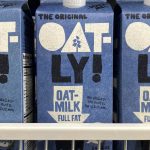State-backed lender Natwest has reported a sharp rise in profits as it followed rivals in clawing back some of the money set aside to cover loans going bad.
The bank, which remains 60% owned by the taxpayer, said pre-tax operating profits rose 82% to £946m for the first quarter partly thanks to a £102m release of funds.
Natwest said continued government COVID support schemes were keeping a lid on business borrowers defaulting on their loans.
Chief executive Alison Rose said there were “reasons for optimism” as the UK’s vaccine programme progresses and restrictions are eased and that its loan book had performed better than expected in the period.
“However, there is continuing uncertainty for our economy and for many of our customers as a result of COVID-19,” she added.
Natwest – previously known as Royal Bank of Scotland – follows rivals HSBC and Lloyds Banking Group this week in clawing back some of the billions they have set aside for loans going bad as a result of the pandemic.
That partly reflects cautious optimism about the UK’s prospects as well as the fact that the government is still pumping billions into support schemes as the economy emerges from deep freeze.
Natwest’s profit comes after it slumped to a £351m annual loss for 2020, a year in which it put aside £3.2bn to cover for loans going bad because of the crisis.
The release of £102m represents a relatively small part of this provision and mainly reflects the bank’s commercial lending where, it said “support schemes continue to mitigate realised levels of default”.






















